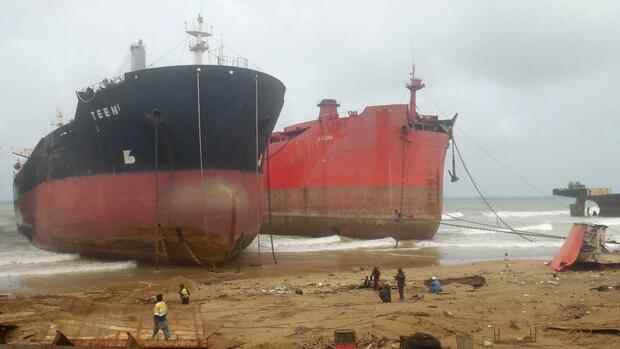The international non-governmental organization Shipbreaking Platform has for years denounced environmental damage, human rights violations, child labour, illnesses and fatalities as well as accidents in connection with the scrapping of old ships via “Beaching”.
(Photo: dpa)
Dusseldorf Exactly 7,073 discarded ships have been scrapped on the beaches of Pakistan, India and Bangladesh since 2009, according to the NGO Shipbreaking Platform. Activists say that 430 workers have paid for the primitive scrapping work, some of which involves working barefoot and with toxic waste, with their lives. Now the so-called “beaching” is once again occupying the German judiciary.
As the NDR and the “Süddeutsche Zeitung” reported on Wednesday, the public prosecutor’s office in Kiel has recently been investigating three people in charge of the Hamburg shipping company Peter Döhle Schiffahrts-KG. The shipping company owners Jochen and Christoph Döhle as well as the managing director Gaby Bornheim are named in the report. Bornheim has also been President of the Association of German Shipowners (VDR) since December, which officially described “beaching” as a “scandal” six years ago.
A spokesman for the public prosecutor’s office in Kiel confirmed the investigation, but did not name any names. The suspects are said to have acted as brokers to bring a container ship to Alang in India for scrapping. The investigation is said to be related to a court hearing that is scheduled to begin in early June. Two managers of a shipping company from Rendsburg, who originally reported to this freighter, are accused.
Reederei Döhle did not want to comment on inquiries, citing ongoing proceedings. “We can assure you that we are interested in a complete clarification of the allegations against us and are fully cooperating with the investigating authorities,” she told the dpa news agency in writing.
Top jobs of the day
Find the best jobs now and
be notified by email.
In principle, the shipping association VDR does not want to comment on matters of member companies. “However, it is important for us to state that against Dr. Bornheim is not being determined in her capacity as President of the VDR,” he emphasized. It is regrettable that the investigation has already become public knowledge. “There is no basis for prejudice.”
This is by no means an isolated case. Already in August last year, there had been searches in the offices and manager’s apartments of the two former Hamburg shipping companies Rickmers and ER Schiffahrt. When the container ships “ER Hamburg”, “MS Florida/Maya Rickmers” and “Alexandra Rickmers” were scrapped, shipping company managers at the time are said to have failed to follow environmental guidelines. So far, however, no charges have been filed.
Legally, improper scrapping on the beaches of Alang (India), Gadani (Pakistan) and Chittagong (Bangladesh) is considered a violation of the Waste Shipment Act. Fines or imprisonment of up to five years are threatened in court.
Proof of illegal scrapping is often difficult
According to the EU directive, the scrapping of discarded ships is reserved for certified facilities, making the direct export of scrap ships illegal. Many of these certified plants are located in Turkey, a few also within the EU and in Indian Alang. But shipowners who circumvent these laws receive around two million euros more for their old freighters if they are scrapped on the beaches of Asia in a way that is harmful to the environment and health.
However, investigators often find it difficult to prove illegal ship scrapping. Ship owners usually sell their steamers that have become unprofitable to intermediate companies who give them a new name and a new flag. The ghost ships often only land on the southern beaches of Asia months later.
According to information from the Handelsblatt, the fact that the investigations against individual shipping company managers repeatedly become public is by no means due to indiscretions by the public prosecutor’s office. “The ads come from Shipbreaking Platform,” reports a Hamburg shipowner. “It also publishes the names of the accused.”
However, the case in Rendsburg is the first German trial in which illegal ship scrapping is charged. For the judiciary, it is a “pilot procedure,” said a spokesman for the public prosecutor’s office.
Actually, environmentally friendly and safe scrapping should have been regulated globally long ago. There has been an international agreement on paper since 2009, which Germany ratified in 2019. However, this so-called “Hong Kong Convention” will only come into force when at least 15 countries with 40 percent of the global merchant fleet tonnage have joined.
There are now 17 countries involved, but they only represent just under 30 percent of the tonnage. According to the World Maritime Organization IMO, only two of the top five ship recyclers – India and Turkey – have signed, while Bangladesh, Pakistan and China have not yet signed.
With agency material
More: The dirty end of a sea voyage
